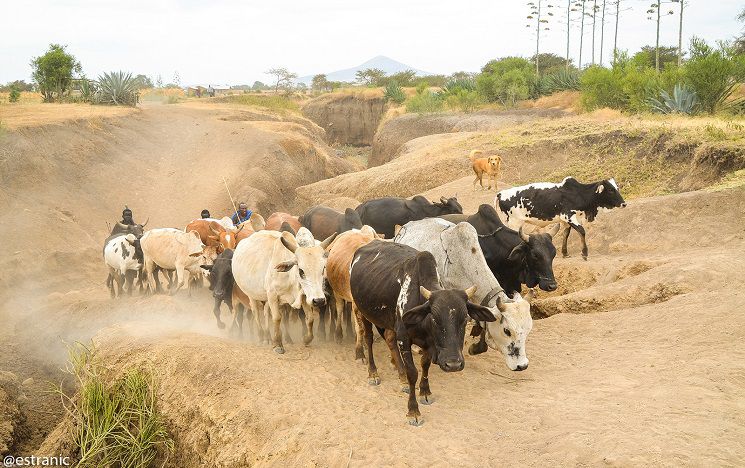Research
Find out more about the research project.

Our research
- The problem
Land degradation affects over 25% of the global land surface, and more than 40% of it takes place in developing countries. It is a pressing problem in sub-Saharan Africa, affecting 51% of land in Tanzania, 23% in Ethiopia, and 22% in Kenya.
This represents a major challenge to agro-pastoralist and farming communities whose resilience and food security strongly depend on healthy land resources. It has a direct negative impact on community and household resilience, but also exacerbates vulnerabilities to climate change. Land degradation increases exposure and sensitivity of agro-ecological systems to climate impacts and reduces effectiveness of climate adaptation options, undermining resilience of the affected communities. It is essential, therefore, to find effective solutions to mitigating land degradation and implement them successfully in order to strengthen climate resilience of agro-pastoralist and farming communities in sub-Saharan Africa and build pathways for climate resilient development.
The proposed project aims to achieve this with a focus on nature-based solutions (NbS).
- Project aim
Our aim is to strengthen climate resilience of agro-pastoralist and farming communities in sub-Saharan Africa by co-developing and testing equitable nature-based solution (NbS) to land degradation based on local knowledge.
We also aim to assess their suitability, feasibility, and scalability, and explore evidence-based pathways to facilitating implementation of such solutions by stakeholders. The project outcomes will provide stakeholders at local to international level with evidence of NbS that are acceptable to stakeholder communities, adaptable to different contexts, and applicable at wider scales.
The research outcomes will increase livelihood stability and food security within the partner communities (SDGs 1 and 2), improve wellbeing (SDGs 3 and 11), and address equity issues (SDG 5).
- Project sites
We will work across three sites: Dedo district in south-western Ethiopia (smallholder farming communities), Monduli district in northern Tanzania (agro-pastoralist communities), and Kajiado county in southern Kenya (pastoralist communities transitioning to mixed farming). Differences across sites will allow us to contextualise findings across various geographic conditions, livelihood types, and socio-cultural contexts.
Work packages
The project aims will be achieved through a continuous exchange between the three Work Packages and in close collaboration with local stakeholders.
- Work package one - Soil
This part of the project will build on local knowledge to co-develop multi-purpose NbS to land degradation, test their effectiveness across contexts, and model scalability. This work package aims to evaluate NbS to land degradation that build climate change resilience in a way that combines local knowledge with robust scientific evidence.
The following research questions will be addressed:
1) Which NbS are supported by local knowledge across contexts and for what reasons?
2) What evidence can be provided for the effects of these NbS on land degradation and sustainability performance indicators?
3) How successfully could the selected NbS be scaled up and out, and what limits their applicability across contexts?
- Work package two -Equity
This part of the project will examine the role of gender, youth, and intersectional inequity and vulnerability in the context of land degradation, and explore pathways to implementing equitable solutions that are sensitive to gender and age-defined social differences.
It will address the following research questions:
1) How do NbS interact with systems/ environments they are located within, including local ecological, policy, social and economic settings?
2) How can customary NbS to land degradation be protected and upscaled, and what are enablers and constraints to doing so?
3) How are climate vulnerabilities linked to land degradation and enablers/ barriers to using NbS to address these framed and constrained by gender, age, and intersectionality issues?
- Work package three - Community
In this part of the project we will develop a community-based social psychological approach to maximizing adoption of the co-selected NbS. We will identify barriers and opportunities for solutions’ adoption across study sites and test a group-based intervention aimed at addressing potential barriers for implementation and strengthening community resilience and wellbeing.
The following research questions will be addressed:
1) What are social psychological predictors of stakeholders’ willingness to adopt co-selected NbS?
2) Can these predictors be strengthened through a group-based intervention, producing an effect on NbS adoption, with co-benefits for stakeholder resilience and wellbeing?